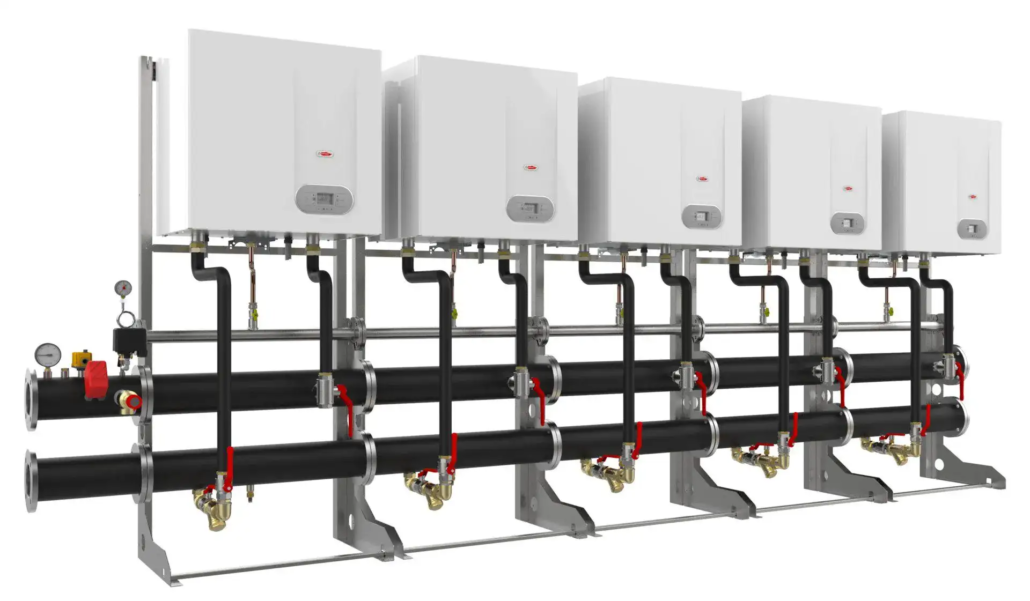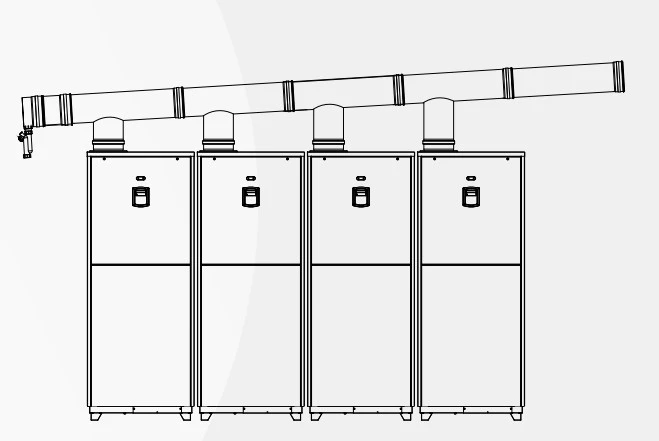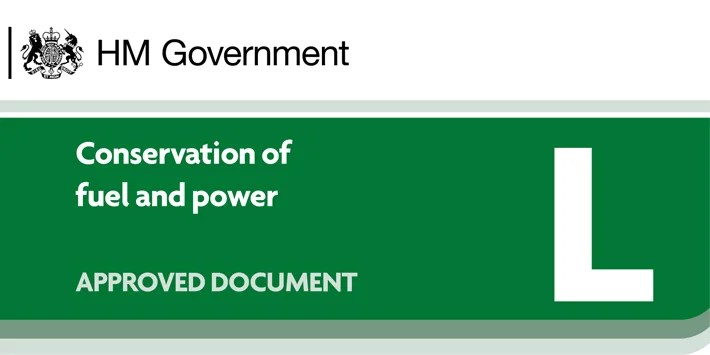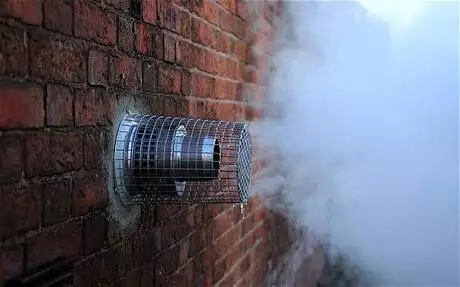Modular Boilers Commercial
Commercial modular boilers with high energy efficiency
Modular boilers commercial – Organizations that require hot water for their commercial space heating, such as schools, hotels and office buildings complexes, frequently employ a modular boiler or a modular boiler system, as they are highly efficient, high performance heating solutions.
Modular boilers are designed to be a high performance and cost-effective alternative to a large single boiler for commercial heating. Each module can be a standalone boiler put in a horizontal arrangement or even as a vertical stack of boiler modules arranged one on top of the other, which gives the boilers an incredibly small footprint, which is great for a boiler room with limited space and allow quick installation for your heating and hot water requirements.
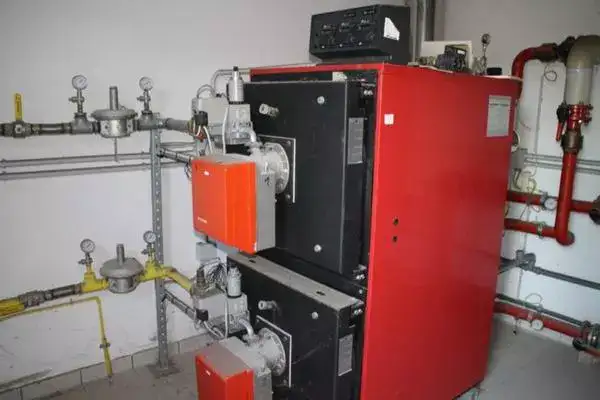
Older vertical mounted modular heating boilers / plant – floor standing gas boilers for commercial buildings
The main advantage of this modular boiler design is that if one module fails, the remaining other modules carry on working normally and continue to provide heating, as the boilers run in a cascade operating configuration. That means you won’t be wasting precious operation time due to maintenance or repairs. By comparison, if a traditional boiler fails, the whole plant shuts down until the boiler is repaired or replaced.
The net result is increase system security for the heating hydronic systems, as modular systems always provide some level of heating, making them the best solution for commercial applications that cannot afford to be with some level of hot water, whether it be for heating or for the production of domestic hot water. You get long-term durability, economies of scale with these boilers as they match the load of the heating system very well.
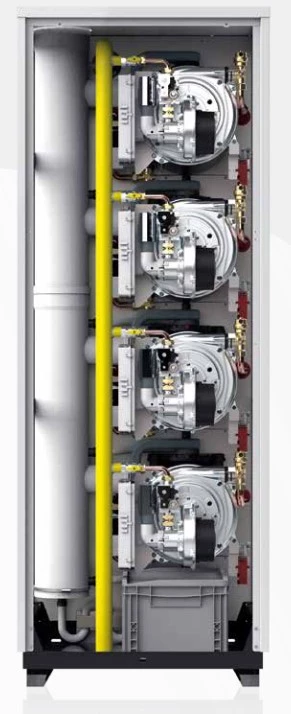
Newer gas fired condensing boilers – with high turndown ratio for better heat load matching for the hvac heating systems- up to 2,000kW of output when used in cascade
If the heating engineer incorporates into the design one backup modular boiler to address demand uncertainties, the capacity is available without consuming energy unless demand demands it. Furthermore, the heating system has redundancy. Any present unanticipated demand might be satisfied by installing more modular units if space is provided in the design process for future development.
For retrofit projects, an efficient and flexible approach can be achieved to either an old boiler replacement, with the many benefits of a smooth changeover installation or they can also be installed alongside the existing heating boiler that services the building. The boilers are easier to physically handle during transport and installation.
With their compact size, the ability to be fitted in tight spaces is a real benefit.
Modular boilers provide demand-based control management to allow for changes in total heating capacity as well as variable seasonal heating capacity or requirements, which results in energy savings.
In cascade mode all the boilers (which these days are a condensing boiler to comply with the ErP regulations), have one master controller installed alongside the relevant safety devices incorporated with the modular boiler system.
Reduce carbon footprint in commercial buildings
These days condensing modular boilers are the standard modular boiler system installed in commercial heating applications, as commercial boilers from 70kW to 400kW have to achieve high energy efficiency, as opposed to the older traditional boiler or conventional boilers that used to be non-condensing boilers.
Condensing boiler technology ensures highly efficient central heating solutions, which is essential in these times of rising energy costs with energy saving being at the top of the HVAC industry and the end users considerations.
Modular boilers work by dividing output capacity, and also increase the heating systems security, with great fuel efficiency as opposed to conventional boiler systems. In short modular boiler systems provide not only a secure but also an efficient approach to essential heating solutions.
Modular boiler systems are not however limited to non domestic buildings or commercial buildings, as they can also be utilised in larger domestic space heating applications as well as opposed to a single boiler room install.
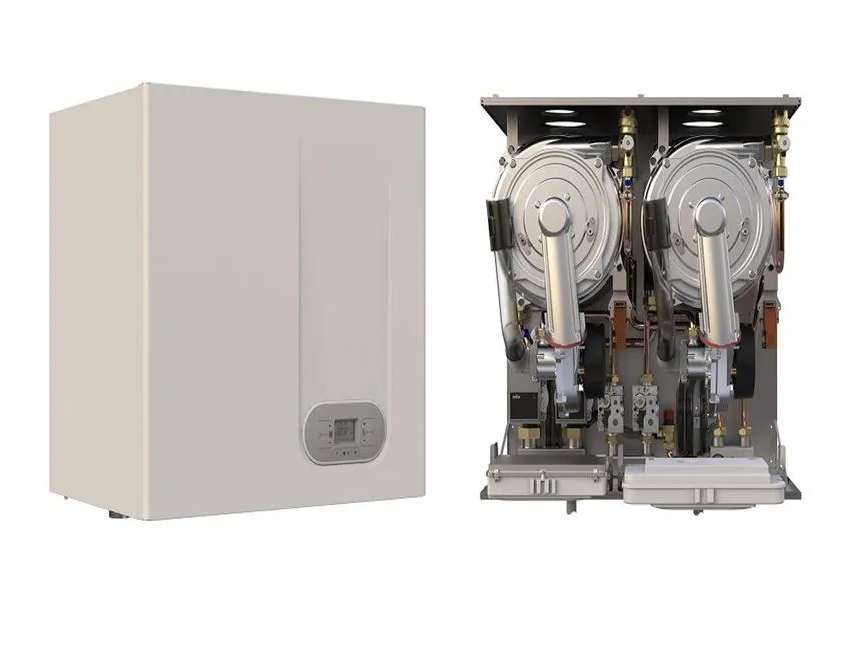
Modular condensing boilers for large domestic or commercial hot water heating – 75kW, 100kW and 120kW are two boilers in one casing with 20:1 turndown ratio –
Modular boiler systems
What are the advantages of modular boiler systems, and what do modular boilers provide?
Even if one of the modular boilers fails, the remaining boilers in the system can keep the building warm enough. Modular boilers are also far more convenient to service. Access to the boilers is typically easier, and one module can be serviced while the others continue to satisfy the system’s heat demand without causing unplanned downtime to the heating system.
Energy efficiency by better heating load matching
One of the key benefits of using modulating boilers installed in a modular boiler system is to precisely match the heat load profile of the building is of large advantage. The modulating boilers in a multiple boiler system can be regulated in such a way that they modulate together and equal the system demand, thanks to a sequence controller installed in the system.
Each modulating boiler is operated in its most efficient mode, i.e., part-load, by igniting the maximum number of boilers required to match the load, with each running at or near its minimal modulation, making them the ideal modular boilers for commercial hotel or similar heating.
This keeps the system’s operating efficiency at a high level or the most efficient state all the way up to maximum output requirements.
Repair and preventive maintenance
A multiple boiler system enables heating system security, as one of the primary advantages of the modular design is that if one of the boiler modules requires repair or maintenance, the others can continue to operate and provide heating while the affected boiler module is repaired. That means you won’t have to worry about maintenance or repairs interrupting your operations.
By contrast, if a traditional separate boiler fails, the entire heating system shuts down until the boiler is repaired or replaced in commercial applications.
Turndown ratios
Modular boilers offer some great benefits when compared to conventional systems, with single large boilers. A single large conventional boiler will have a high minimum output level, whereby multiple small units or separate modules, each with their own burner allows the individual boilers to modulate to the heating and hot water system variable levels or requirements which leads to lower energy consumption for these commercial boilers.
Building automation system (BAS) or Building management system (BMS)
Building automation or building management systems are often used as one master controller for commercial building HVAC systems. This means that the modular boilers work under the full control of the BMS system, which monitors the heating demand, and adjusts the heat output and the numbers of modular boilers needed to operate during the heating season.
This results in the space heating being run at the most efficient state, resulting in high efficiency, reduced energy usage and energy operating costs. All our modular boilers can be controlled by building automation or management systems, directly via a 0-10V signal.
We also do controllers which are a mini control system for the modular boiler system, which will also ensure rotating boilers or heat exchangers within the modular boiler systems.
Heat exchangers
All our gas commercial boilers range and commercial oil condensing boilers range benefit from a reliable and efficient stainless steel heat exchanger.
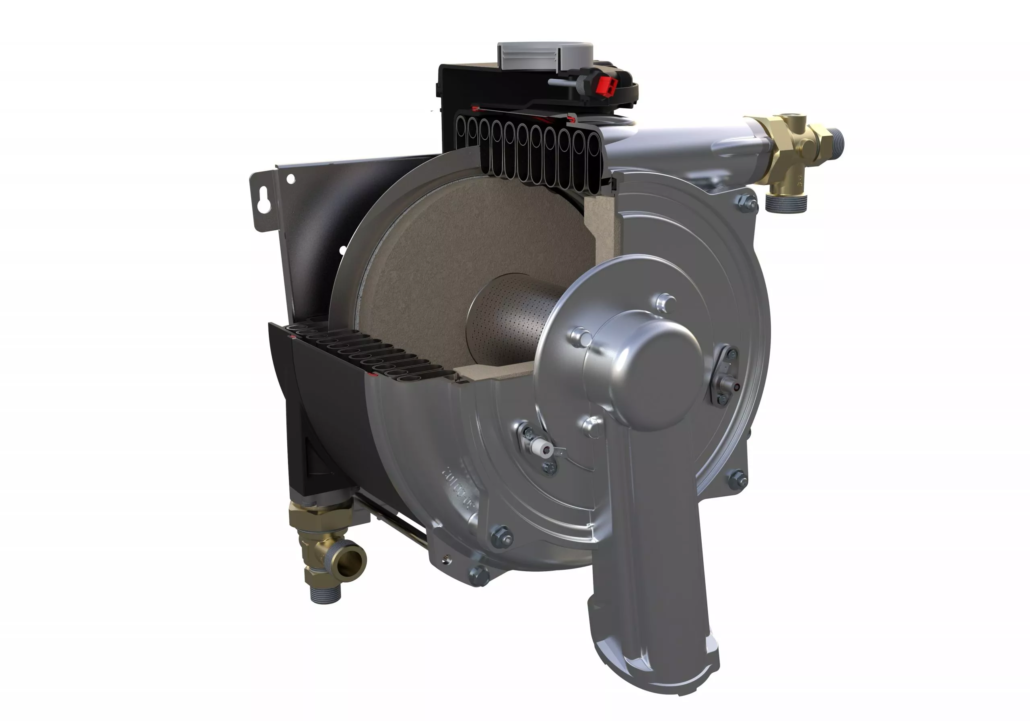
Commercial heating boiler heat exchanger with high modulation rate – manufactured in stainless steel
Hot water boiler system
Modular boiler systems may be set up to sequence boilers in cascade or unison mode. Cascade control starts a boiler at its lowest heating rate, regulates it to its highest rate, and then starts the next boiler to fulfil the system demand. This approach uses the fewest number of boilers to meet the heating load requirements.
For our gas fired ( natural gas or propane gas options ) modular boilers, please see our dedicated webpage here – Commercial Gas Boilers
or for our oil fired option – please see the following webpage – Oil Condensing Boilers
and finally our industrial and commercial electric boiler range, which can be cascaded up to 5mW of output
Commercial boilers – Modular boilers
We at Flexiheat UK, do a full range of modular boilers commercial in various fuel options such as natural gas, propane gas or oil, with the best boiler turndown ratio on the market, that provide reliable heating solutions in a modular or cascade installation. Please don’t hesitate to contact our sales service team on 01202 822221 or use our email contact form via the contact tab above to message us.

